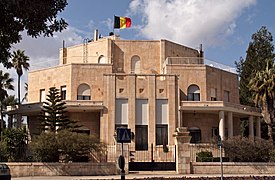
The Palestinian territories are the two regions of the former British Mandate for Palestine that have been occupied by Israel since the Six-Day War of 1967, namely the West Bank and the Gaza Strip. The International Court of Justice (ICJ) has referred to the West Bank, including East Jerusalem, as "the Occupied Palestinian Territory", and this term was used as the legal definition by the ICJ in its advisory opinion of July 2004. The term occupied Palestinian territory was used by the United Nations and other international organizations between October 1999 and December 2012 to refer to areas controlled by the Palestinian National Authority, but from 2012, when Palestine was admitted as one of its non-member observer states, the United Nations started using exclusively the name State of Palestine. The European Union (EU) also uses the term "occupied Palestinian territory". The government of Israel and its supporters use the label "disputed territories" instead.

The status of Jerusalem has been described as "one of the most intractable issues in the Israeli–Palestinian conflict" due to the long-running territorial dispute between Israel and the Palestinians, both of which claim it as their capital city. Part of this issue of sovereignty is tied to concerns over access to holy sites in the Abrahamic religions; the current religious environment in Jerusalem is upheld by the "Status Quo" of the former Ottoman Empire. As the Israeli–Palestinian peace process has primarily navigated the option of a two-state solution, one of the largest points of contention has been East Jerusalem, which was part of the Jordanian-annexed West Bank until the beginning of the Israeli occupation in 1967.

Corpus separatum was the internationalization proposal for Jerusalem and its surrounding area as part of the United Nations Partition Plan for Palestine. It was adopted by the United Nations General Assembly with a two-thirds majority in November 1947. According to the Partition Plan, the city of Jerusalem would be brought under international governance, conferring it a special status due to its shared importance for the Abrahamic religions. The legal base ("Statute") for this arrangement was to be reviewed after ten years and put to a referendum. The corpus separatum was again one of the main issues of the post-war Lausanne Conference of 1949, besides the borders of Israel and the question of the Palestinian right of return.

The Jerusalem Embassy Act of 1995 is a public law of the United States passed by the 104th Congress on October 23, 1995. The proposed law was adopted by the Senate (93–5), and the House (374–37). The Act became law without a presidential signature on November 8, 1995.
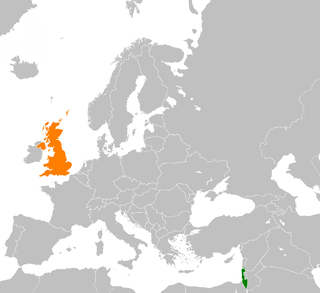
Israel–United Kingdom relations, or Anglo-Israeli relations, are the diplomatic and commercial ties between the United Kingdom and Israel. The British embassy to Israel is located in Tel Aviv. The UK has an honorary consul in Eilat and a non-accredited consulate-general in Jerusalem, that represents the United Kingdom in that city and the Palestinian territories. Israel has three representative offices in the United Kingdom: an Embassy located in London and consulates in Cardiff and Glasgow.

The Consulate General of the United States in Jerusalem was a diplomatic mission of the United States of America that provided consular services to Palestinian residents in Jerusalem, the West Bank and Gaza. It was not accredited to any government. In May 2018, the United States relocated its Tel Aviv embassy to Jerusalem, and in mid-October 2018, U.S. Secretary of State Mike Pompeo announced that the Consulate General would be merged with the new US Embassy in Jerusalem and that relations with the Palestinians would be conducted through a special Palestinian Affairs Unit inside the Embassy. On 4 March 2019, the Consulate General was merged into the US Embassy and formally ceased operations. In May 2021, U.S. Secretary of State Antony Blinken announced that Washington will reopen the consulate, without specifying a date. In September 2021, Palestinian Authority Prime Minister Mohammad Shtayyeh called on the US administration to speed up the reopening of the Consulate General in Jerusalem to handle direct contacts with the Palestinians.

Israel and Spain have maintained diplomatic ties since 1986. Israel has an embassy in Madrid. Spain has an embassy in Tel Aviv, and an honorary consulate in Haifa. There is also a General Consulate in Jerusalem, which serves as a diplomatic mission to the city of Jerusalem, Gaza and the territories of the West Bank. In addition to both countries being member states of the United Nations, both countries are members of the Union for the Mediterranean.
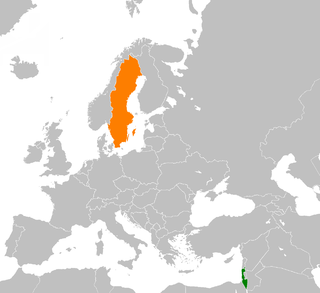
Israel–Sweden relations refers to the bilateral relations between Israel and Sweden. Israel has an embassy in Stockholm while Sweden has an embassy in Tel Aviv, a Consulate General in Jerusalem and honorary consulates in Eilat and Haifa. The diplomatic relations between the two countries were briefly damaged when Sweden became the first member of the European Union to recognize the State of Palestine in 2014. Previously, other members had recognized Palestine, but that was before they joined the EU.
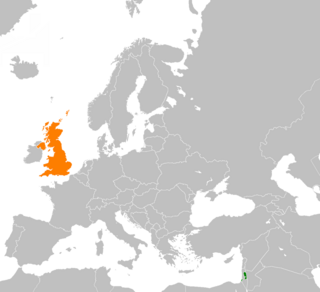
The United Kingdom does not recognise Palestine as a state. The UK has a non-accredited Consulate General in Jerusalem that "represents the UK government in Jerusalem, West Bank, and Gaza", and works on "political, commercial, security and economic interests between the UK and the Palestinian territories". Husam Zomlot became head of the Palestine Mission to the United Kingdom in 2018. The State of Palestine was represented in London by Manuel Hassassian, the Palestinian General Delegate to the United Kingdom between 2005 and 2018. Another former Palestinian General Delegate to the UK was Afif Safieh, who began in that role in 1990.

The Consulate General of France in Jerusalem began its tumultuous history in the early 17th century. In 1535, the date of the first Capitulation between France and the Ottoman Empire, France was granted the right to appoint consuls in the cities of the Empire. The Capitulations constituted the legal basis of the French protectorate over the Holy Places, Catholic Christians, and by extension, Orthodox Christians. In 1623, King Louis XIII appointed the first consul in Jerusalem "for the Glory of God and to relieve the pious pilgrims who by devotion visit the Holy Places." The presence of consuls in Jerusalem was intermittent until 1843. Amidst the growing competition between European powers over the exclusive protectorate that France was entitled to exercise over Christians, the rank of the Consul in Jerusalem was raised to that of a Consul General in 1893. Despite the abolition of France's protectorate over the Latins and the Turkish-ruled Holy Places in 1914, the Consulate General tried to maintain and expand its influence in Palestine. Since the creation of the state of Israel in 1948, the Consulate General of France in Jerusalem has held the status of a quasi-embassy. The consulate is responsible for the area of the corpus separatum and the occupied territories. The consulate's districts include Jerusalem, the Gaza Strip and the West Bank. The Consulate General is independent from the Embassy of France in Tel Aviv and does not have official diplomatic relations with Israel. All contacts with the State of Israel lie exclusively within the jurisdiction of the embassy in Tel Aviv. Since its establishment in 1994, the consulate has been the French diplomatic representative to the Palestinian National Authority.

Political relations between the State of Palestine and the United States have been complex and strained since the 1960s. While the U.S. does not recognize the State of Palestine, it recognizes the Palestine Liberation Organization (PLO) as the legitimate representative entity for the Palestinian people; following the Oslo Accords, it recognized the Palestinian National Authority as the legitimate Palestinian government of the Palestinian territories.

The Embassy of the United Kingdom is located in Tel Aviv. It is the chief diplomatic mission of the United Kingdom in Israel.

On December 6, 2017, the United States of America officially recognized Jerusalem as the capital city of the State of Israel. American president Donald Trump, who signed the presidential proclamation, also ordered the relocation of the American diplomatic mission to Jerusalem from Tel Aviv, constituting what is now the Embassy of the United States in Jerusalem, which was established on the grounds of the former Consulate General of the United States in Jerusalem. Israeli prime minister Benjamin Netanyahu welcomed the decision and praised the announcement by the Trump administration. On December 8, U.S. Secretary of State Rex Tillerson clarified that Trump's statement "did not indicate any final status for Jerusalem" and "was very clear that the final status, including the borders, would be left to the two parties to negotiate and decide" in reference to the recognition's impact on the Israeli–Palestinian peace process.
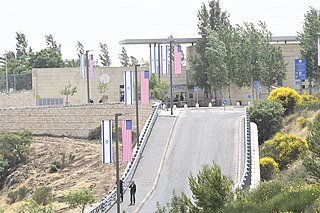
The Embassy of the United States of America in Jerusalem is the diplomatic mission of the United States of America to the State of Israel. It is located in Talpiot, a neighborhood in southeastern Jerusalem. In mid-October 2018, Mike Pompeo, the Secretary of State under the Trump administration, declared that the new embassy would be merging with the Consulate General, through which the United States had maintained diplomatic relations with the Palestinian Authority. Currently, all diplomacy between the United States and the Palestinians is conducted through the "Office of Palestine Affairs" inside of the American embassy for Israel.
The Consulate General of Sweden, Jerusalem is the diplomatic mission of Sweden in Jerusalem. The history of the Swedish consulate in Jerusalem dates back to 1901 when Herman Zethelius proposed its establishment due to the increasing Scandinavian presence in the city. Initially serving as an honorary consulate, it later became a vital hub for Swedish nationals and others seeking assistance in the region. Over the years, the consulate's responsibilities expanded to include monitoring the Israeli–Palestinian peace process and facilitating development cooperation initiatives. In 1991, the honorary consulate was upgraded to a career consulate general, reflecting the growing importance of Sweden's presence in the region. The consulate's buildings have changed locations several times, with the current chancery situated in Sheikh Jarrah, East Jerusalem, and the residence in the Greek Colony area, West Jerusalem. The Swedish consulate's role remains pivotal, providing consular services, promoting dialogue, and contributing to peace-building efforts in the region.

